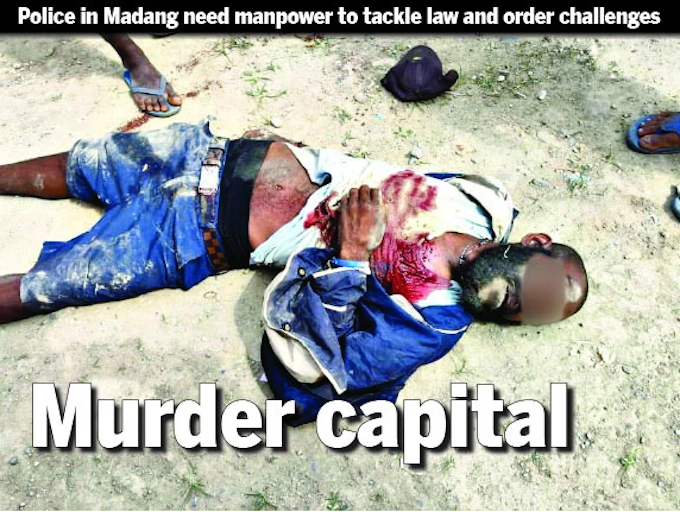
By Dorothy Mark in Madang, PNG
In the last 15 days of the month of July, 15 murders have occurred in the northern Papua New Guinean town of Madang — once described as “beautiful” — and the community now faces a law and order crisis.
Madang Mayor Peter Masia said the Madang district authority could not do much in assisting police to actively carry out law and order action because public funds were still on hold after sitting MP Bryan Kramer had been dismissed as Madang MP.
Calling Madang the “murder capital of PNG”, Masia said there had been an increase in killings with the latest killing occurring yesterday afternoon.
Compared to the National Capital District (NCD) — Port Moresby — where killings happen every 2 to 3 days, Madang has seen killings every day for the last 15 days.
An NCD police officer confirmed that every 2 to 3 days they were responding to a report of a killing in Port Moresby.
“Yesterday a young man in his mid 20s from Angoram in East Sepik was stabbed in the chest by a street seller in broad daylight in the heart of [Madang] killing him instantly,” he said.
Madang police desperately need resources to help them tackle Law and Order challenges in the province everyday.
Police need housing, vehicles
A senior policeman who wished not to be named said Madang police needed housing, vehicles and things like office stationery and manpower to boost police work in the province.
There are two police stations in Madang — one is the Jomba police station and the other is the town police station.
The officer said the estimated population ratio for one policeman to the Madang population was 1:1500 to 2000.
He said they needed more police manpower to tackle the law and order problems, especially the killings that were happening every day.
Transgogol people are now calling on the government to establish a police mobile squad base in the area to prevent more brutal murders in their area.
Transgogol community leader and spokesman Morris Bann said there was state-owned land available.
He said the type of killings in the area warranted the government to take serious steps in addressing law and order.
Call for police mobile squad
“We want a police mobile squad base built . . . so that law and order is monitored closely to instill the trust and security the people require from its government,” said Bann.
Madang town resident Breed Kanjikali said the number of deaths required all Madang MPs to step in and address issues affecting the province and map out how they would assist police in combating crimes in the province.
Bundi leader Alois Pandambai said the murder toll in the province was very significant and it portrayed an image where there was dysfunction in the political leadership of the province.
He said Madang province did not seem to be functioning normally in the last seven months because of a political hussle and tussle over the position of the Provincial Administrator Frank Lau.
“While our leaders are fighting over an appointment made by the NEC [National Executive Council], we are not giving 100 percent support to police work and our own people are being killed everyday,” he said.
The 10 Nissan Patrol vehicles bought two years ago to support police work were now experiencing mechanical faults and had been grounded.
Dorothy Mark is a PNG Post-Courier reporter. Republished with permission.













































In the past, Madang was so clean, famous, crime-free, and the home of many European visitors, colonisers, and migrants (Germans, British, Americans, and Japanese all left their mark on Madang). In Madang, the famed Russian anthropologist, humanist, biologist, and scientist Nicholai Nikolaevich Miklouho-Maclay lived with the Tui people while advocating for Indigenous Papuan rights to be free from European colonization. Local politicians steal all the money, the Chinese control all the businesses, and only a few Aussies run their businesses there. Locals have been abandoned on the streets, without jobs and without money. Despite the high presence of foreign influence, the local population of Madang has suffered greatly, left destitute with few opportunities for work or economic stability. This has created a level of desperation and despair among the local population, with many feeling powerless to fight back against the unfair circumstances they are faced with. Papua New Guinea’s central government and provincial governments must feel ashamed for what is happening in Madang.
Comments are closed.